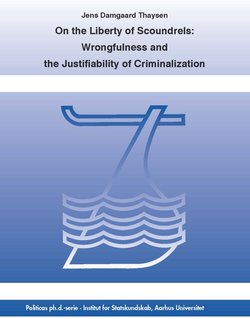Jens Thaysen Damgaard
On the Liberty of Scoundrels: Wrongfulness and the Justifiability of Criminalization

This dissertation investigates the relationship between law and morality by inquiring into the relationship between the wrongfulness of conduct and the justifiability of its criminalization. It engages with two claims about this relation, namely, legal moralism and the wrongness constraint. Legal moralism is, roughly, the view that the wrongfulness of conduct always contributes to justifying its criminalization, though the fact that some conduct is wrongful might very well be insufficient to render its criminalization justified in the face of the powerful reasons against criminalization grounded in the negative impact criminalization tends to have on individual autonomy and privacy. The wrongness constraint is, roughly, the view that it is never justified to criminalize anything but wrongful conduct. The dissertation argues that the wrongfulness of conduct as such does not contribute to the justification of its criminalization, since the mere fact that some conduct is wrongful does not contribute to explaining why proscribing it is the proper business of the state. The dissertation further argues that criminalizing conduct that is not wrongful is sometimes justified. This is so since it can be justified to criminalize conduct which is such that those who engage in it have an enforceable duty to undergo state punishment, and there is some permissible conduct of which this is true. The dissertation thus argues that we should both reject legal moralism and the wrongness constraint. It suggests that there is little principled relation between the wrongfulness of conduct and the justifiability of its criminalization.
![]() Ophavsretten tilhører Politica. Materialet må ikke bruges eller distribueres i kommercielt øjemed.
Ophavsretten tilhører Politica. Materialet må ikke bruges eller distribueres i kommercielt øjemed.